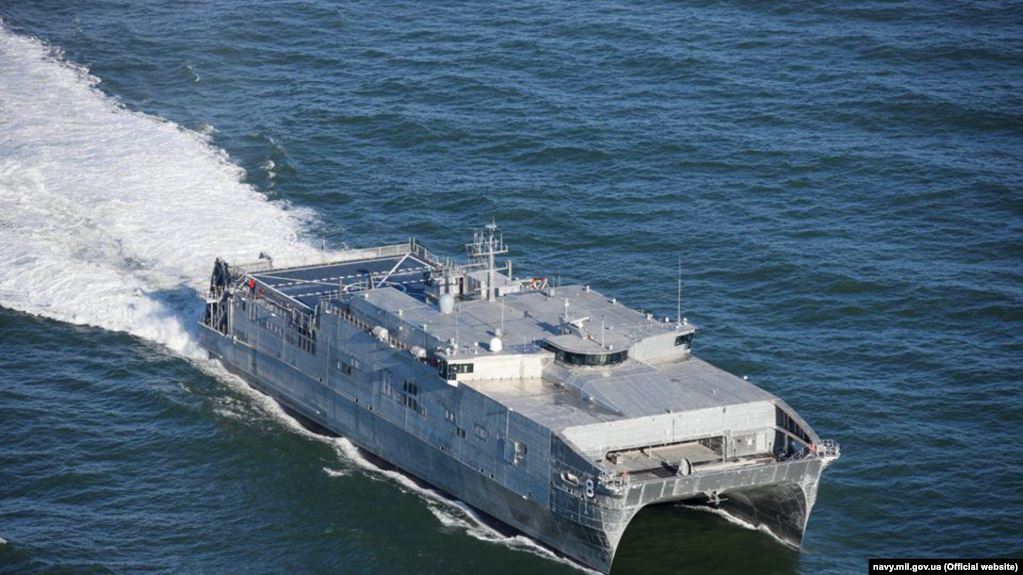
By Polygraph
“The Georgian authorities are not giving a U.S. Navy transport [vessel] permission to enter their country’s territorial waters.”
False
Georgian authorities have debunked the claim as disinformation.
On September 17, news stories claiming Georgian authorities had refused the U.S. Navy vessel USNS Yuma entry to the country’s territorial waters in the Black Sea trended on Yandex.ru — the Russian equivalent of Google News. A variety of media outlets published the stories, which raised questions about the state of relations between the U.S. and Georgia.
However, the claim made in these stories is false.
It was debunked by Georgian authorities, who said that the Georgian port of Poti could not admit the USNS Yuma into its terminals due to technical issues. “We could not provide the necessary equipment,” the port authorities told the Georgian daily Resonance, adding: “This is a normal business operation.”
Elizabeth Rood, deputy chief of the U.S. mission in Tbilisi, told Netgazeti.ge that the U.S. vessel was heading to the port of Poti to refuel but could not be admitted since the port was full of commercial ships.
A live map (screenshot taken September 17 at 1:10 EAT) of the Black Sea waters near the port of Poti showed the density of the marine traffic, confirming Rood’s account.
Commander Kyle Raines, Public Affairs Officer of the U.S. Sixth Fleet, told Polygraph.info via email that the Russian report was false: “This is false. There was a commercial vessel delayed at the berth in Poti where USNS Yuma was scheduled to make a routine resupply stop. Given the length of the commercial vessel’s delay, USNS Yuma departed according to her scheduled timeline, which also prevented further delays to follow-on scheduled commercial ship traffic in Poti.”
The USNS Yuma’s most recent location confirms Raines’ statement. A live map (screenshot taken September 18, 1:11 PM EAT) showed the USNS Yuma well advanced on its course in the Black Sea.
This suggests the Russian news reports claiming that Georgia had barred a U.S. naval vessel from its Black Sea Port were fabricated and pushed as a part of an information campaign designed to cause confusion about the state of U.S.-Georgian relations between the U.S. and Georgia.
These news reports were based on information disseminated by the Telegram channel of the Russian web portal “Operativnaya Liniya,” (“Operational line”), which was also the source of the first tweet concerning the alleged barring of the U.S. naval ship.
A Twitter search for the USNS Yuma confirmed that the same accounts pushed that same news in Russian across the platform.
Operativnaya Liniya describes itself as “not a media outlet” and uses a complex scheme to hide its origins. Its IP address and DNS analysis reveal only information about its host – the Russian host services provider OOO-TimeWeb, located in Saint Petersburg.
However, multiple reliable media outlets refer to Operativnaya Liniya as a “portal of the Russian security forces in the Caucasus.”
The report was immediately picked up by another obscure website – Avia.pro, which identifies itself as a “Russian federal news agency.” Avia.pro served as a proxy in spreading the report to other platforms, including Yandex.ru and major Russian and several foreign media outlets.
The IP and DNS analyses for Avia.pro show that the site also uses a scheme to help hide its origins (geolocated in the Netherlands), though less complex than the scheme used by Operativnaya Liniya. However, open-source data reveal that the domain is registered in Moscow, Russia, using a private address in an apartment building. In addition, the Russian tax authority’s registry shows a company listed at the same address with one employee – the same person under whose name Avia.pro is registered, along with fifteen other domains registered between 2010 and 2018.
By Polygraph











